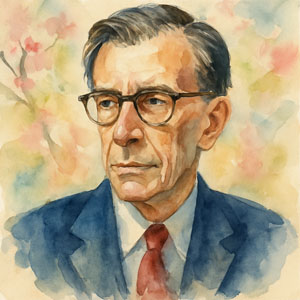— John Kenneth Galbraith
 Economist and writer John Kenneth Galbraith (1908–2006) was born on a farm in Ontario, Canada. Towering at six‑foot‑eight, the clear-thinking progressive economist became internationally known for advancing Keynesian ideas and for making economics readable to a wide audience.
Economist and writer John Kenneth Galbraith (1908–2006) was born on a farm in Ontario, Canada. Towering at six‑foot‑eight, the clear-thinking progressive economist became internationally known for advancing Keynesian ideas and for making economics readable to a wide audience.
“If all else fails, immortality can always be assured by spectacular error,” he joked. Galbraith taught at Harvard—counting John F. Kennedy among his students—and later served as U.S. ambassador to India in the Kennedy administration. He also worked passionately on both of Adlai Stevenson’s presidential campaigns opposing Dwight D. Eisenhower.
“One of the greatest pieces of economic wisdom is to know what you do not know.” His groundbreaking bestseller Affluent Society (1958) gave us the phrase “conventional wisdom,” while The New Industrial State (1967) argued that large corporations—more than pure free enterprise—shape the U.S. economy.
A principled economic thinker and adviser to presidents, he could also be wry: “Nothing is so admirable in politics as a short memory.” With sharp wit and uncommon skill, Galbraith drew the public into serious questions of policy and prosperity.
“Wealth, in even the most improbable cases, manages to convey the aspect of intelligence.” His work invites us to test assumptions, to change our minds when evidence and conscience ask us to.
 Think clearly. Choose wisely.
Think clearly. Choose wisely.
